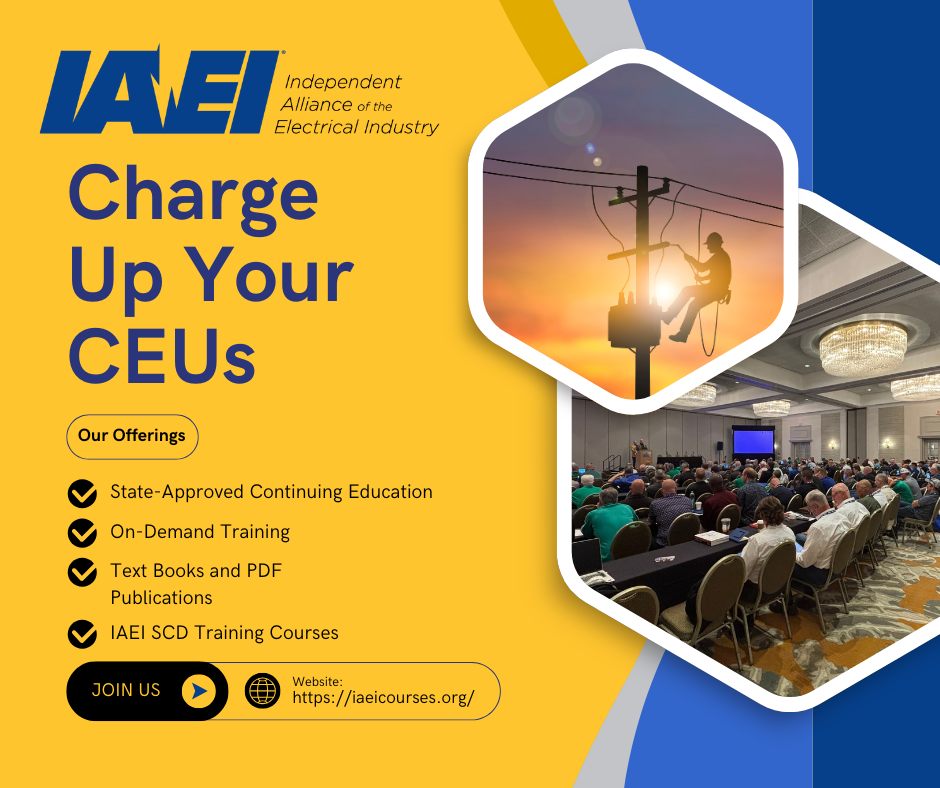The responsibility of an electrical inspector is clearly stated in Section 90.2 of the 2023 edition of the National Electrical Code, “…the practical safeguarding of persons and property from hazards arising from the use of electricity.” In order for this to be achieved, the inspector needs to have knowledge of electricity, knowledge of the code, and the people skills required to communicate this knowledge to the men and women installing the work. Professional, reasonable, approachable, and knowledgeable are essential characteristics of a good inspector.
Inspectors need to have confidence in their knowledge of the Code in order to apply the code correctly. This requires that they keep current with updates and changes to the code as well as any applicable local amendments. Keeping abreast of new products is also important. Continuing education units (CEU) and publications such as the IAEI magazine are useful tools to accomplish this. Confidence and knowledge develop with experience. The longer you are out there, the more you see and the more experience you will have. Every inspector can recall the first time they were sent out to perform an electrical inspection on their own. Going back to the codebook to check and recheck, making sure the proper code reference was given. Over time you begin to realize that you know the code references from memory.
In evaluating electrical installations for code compliance, inspectors will also need to think outside the box when considering alternative methods that meet the intent of the code. It is important not to inspect to a black-and-white standard, put to the letter of the law. There is a lot of gray that resides between the black and white. Inspections do not always fit neatly in the box, and there will be times when the inspector will have to make a judgment call when faced with a gray area. Is it a violation, and if so, is it an electrical hazard? Does the situation present an imminent life safety threat? There may be times when inspections need to be done on older buildings, and a determination will need to be made as to how far you go with upgrades to the electrical system. Another factor that may need to be considered is politically sensitive jobs. This can present challenges that the inspector may need to address in that gray area.
Electrical inspectors are the authorities who have jurisdiction in the field and represent their building department. Therefore, it is important always to conduct yourself in a professional manner, be respectful of others, and be approachable. People will respect inspectors who conduct themselves in this way. Being on time for scheduled appointments shows that you respect the other person’s time and that you are a professional who strives for a high level of customer service. This also helps to build a better working relationship between the inspector and the electrician.
The electrical industry is changing as new technology evolves. Photovoltaic and energy storage are two examples of new technology that can be challenging for an inspector. Inspectors must always continue to educate themselves and stay current with new technology. It is important to have confidence in your abilities but also be willing to admit when you are wrong. We have all made a bad call in the field at some point in our careers. How we handle making a bad call goes back to professionalism. What has worked for me is to own up to the bad call. Admit you were wrong and that the other person was right and move forward. People will respect you for that.
Electrical inspectors should also take the time to complement good work. Electricians take pride in their work, and a sincere compliment from the inspector will encourage them to continue to do quality installations. This also helps to build mutual respect between the inspector and the electrician. I remember when I was a new inspector, there was a job scheduled for an inspection. It was the end of a busy day and one of my last inspections. The work was neatly done and code-compliant, and the inspection was passed. The electrician was a young man, and he was very proud of his work. He told me that this was the first job his employer gave him the responsibility of installing on his own. I complimented his work and moved on to my next inspection. Later that evening, I thought about that young electrician. Although I complimented his work, I failed to pick up on his enthusiasm. I realized that I did that electrician a disservice by not showing more enthusiasm for the good work. It was at that moment that I promised myself I would be more of a mentor, recognizing and offering sincere praise for the effort to do quality work.
As electrical inspectors, we have the ability to encourage and influence electrical professionals of all ages. Just as a journeyman electrician teaches his trade to an apprentice, we seasoned electrical inspectors have a lot to offer those just beginning their careers as inspectors. We take pride in our work as electricians and our knowledge of the code. We need to pass this knowledge on to those we mentor, for they are the future of our industry.











Find Us on Socials